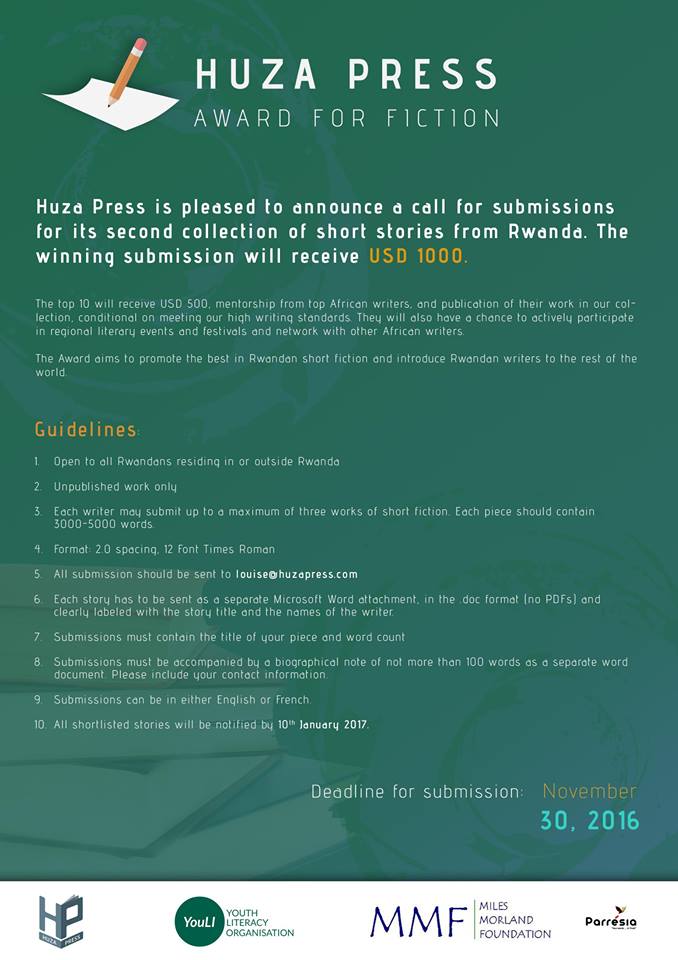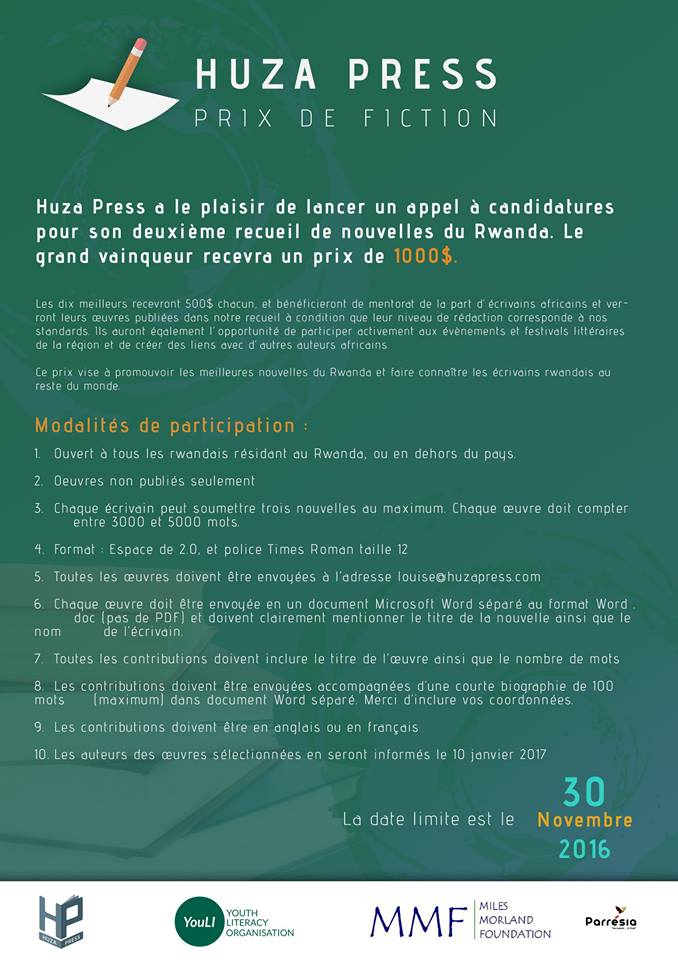AiW Guest: Louise Umutoni
As part of Writivism 2016, University of Bristol, Stellenbosch University and the Centre for African Cultural Excellence collaborated to bring together an Arts Management and Literary Entrepreneurship Workshop. This four-day workshop held in August in Kampala was set up with the aim of giving 35 aspiring and early career arts managers and entrepreneurs in the African literary and cultural scene the opportunity to build market knowledge, develop project management skills, share best practice, and network with colleagues from across the continent. Each day of the workshop focused on ways of setting up, thinking about and sustaining a different kind of literary initiative. As part of a session on ‘Managing a Literary Prize’, Louise Umutoni, Zukiswa Wanner, Kate Haines and Sumayya Lee all shared their experiences of being involved with literary prizes from the Huza Press Award for Fiction to the Etisalat Prize for Literature, from the Kwani? Manuscript Project to the Writivism Short Story Prize. Discussions ranged across the practicalities involved in establishing a new literary prize to the judging process and the factors that shape a prize’s larger impact. Ahead of the deadline for the second edition of the Huza Press Award for Fiction, Africa in Words is happy to be able to share a piece drawing on Louise Umutoni’s contribution to this conversation.
We started Huza Press for the same reasons that many literary initiatives on the continent are started – to provide a platform for African voices and in our case Rwandan voices. We needed to see more stories about Rwanda from Rwandans. For us, it was the pressing need to reclaim our narrative, which as many of you are aware was being largely told by non-Rwandans. We were also aware that we had been reduced to a single story and (like Chimamanda Ngozi Adichie) understood the dangers of that. To date any mention of Rwanda is closely followed by the word genocide and, as vital as this is to our history, it is not our only experience.
We set up the Huza Press short story competition (the first of its kind in Rwanda) to find out what stories Rwandans were interested in telling. We received stories from across the country and were pleasantly surprised to read stories that addressed all manner of topics. These were stories about love and hate, friendship and hope – from the sinister lens on gender-based power struggles of Daniel Rafiki’s ‘Versus’ to the longing for connection across boundaries of Akaliza Gara’s fantastical ‘Impanga’. The sheer volume of submissions was a clear sign that Rwanda was bursting at the seams with stories, and that Rwandans were eager to share their experiences with the world. We saw this as validation of what had started out as a hunch.
Of course it wasn’t easy (as is the case with such initiatives). We are still working to secure the necessary funding to ensure that this competition can happen annually. We considered not attaching prize money to the award, but after various conversations with writers we realised that the funds served as an important form of motivation. It also proved to writers that their work was valued and reinforced that view that literary prizes have the propensity to bestow value on the works of writers, including monetary value.
There was also the issue of selecting the right judges. Who was in a position to judge a Rwandan prize for literature? Was it strictly Rwandans or could non-Rwandans with judging experience fit the bill? Did we have Rwandans who had judged a writing prize? Was it even necessary to find someone with this sort of experience? All these were questions we wrestled with before drawing together our first judging panel of Richard Ali, Shadreck Chikoti and Beverley Nambozo Nsengiyunva.
The other big question was language. A lot of prizes for African literature struggle with language issues: for example the Caine Prize for African Writing is often criticized for being a prize for Anglophone African writing despite being open to submissions in translation. Rwanda is a country that has a difficult relationship with language. From the adoption of French under Francophone ‘assimilation’ policies (later reinforced by the Belgians) to a celebration of so-called Rwandan heritage defined in the very narrow terms of Hutu liberation and later the rejection of the Francophone heritage in favour of a closer relationship with the Commonwealth. Today, Rwanda is a trilingual country even if we have the unusual gift of a single local language – Kinyarwanda. In the context of this history, selecting a language of submission proved very difficult. We picked English because it was a language with very little writing from Rwandans and in essence to contribute to the existing canon of Anglophone African literature. As my friend from Ishyo (Kigali’s leading arts centre) reminded me, the Francophone community was writing long before ‘les Anglophone’ decided to pick up the pen. In 2016 we now have the capacity to open up the prize to submissions in both English and French.
 I suppose our biggest takeaway from this process has been realising the complexity of managing a literary prize. We encountered issues of language, canon-creation and our role in this, as well as inescapable issues of financing and sustainability. We also realised that our writers still needed quite a lot of support to improve their writing. Schools in Rwanda do not teach literature courses and the reading culture is still very poor. We therefore added a mentorship component to our prize, with the shortlisted writers working with established writers from Taiye Selasi to Jennifer Nansubuga Makumbi to improve their writing. We also ran workshops with the shortlisted writers and hope in the future to open these up to a wider public. Essentially ours is a journey that’s only beginning, picking lessons here and there, to ensure that we can curate a prize that best serves Rwandans.
I suppose our biggest takeaway from this process has been realising the complexity of managing a literary prize. We encountered issues of language, canon-creation and our role in this, as well as inescapable issues of financing and sustainability. We also realised that our writers still needed quite a lot of support to improve their writing. Schools in Rwanda do not teach literature courses and the reading culture is still very poor. We therefore added a mentorship component to our prize, with the shortlisted writers working with established writers from Taiye Selasi to Jennifer Nansubuga Makumbi to improve their writing. We also ran workshops with the shortlisted writers and hope in the future to open these up to a wider public. Essentially ours is a journey that’s only beginning, picking lessons here and there, to ensure that we can curate a prize that best serves Rwandans.
We are hugely proud to have been able to launch the second edition of the Huza Press Award for Fiction this year. It is especially important because we survived the common ‘one-show’ curse. Running the competition for the second-year in a row serves as validation that this is in fact an initiative that is needed in Rwanda. Rwandans want to write and they want their work acknowledged. We want this prize to not only recognize the work of writers, but encourage them to continue creating. Our call out (see below for more details) asks for the submission of unpublished pieces of short fiction between 3000 and 5000 words in English or French by Rwandans anywhere in the world until 30 November 2016. As last year, the winner will receive $1000 and a shortlist of ten will receive mentorship by established African writers and be published in an anthology. This year, in addition, all shortlisted writers will receive $500. The Huza Press Award for Fiction is a literary prize targeted at emerging writers; we are excited about reading this year’s stories and finding new Rwandan literary talent.
 Louise Umutoni is a writer and media consultant. She is the founder and director of Kigali-based publishing company Huza Press. In 2006 she won the award for Best Arts and Culture Journalist at the Rwanda Golden Pen Awards.
Louise Umutoni is a writer and media consultant. She is the founder and director of Kigali-based publishing company Huza Press. In 2006 she won the award for Best Arts and Culture Journalist at the Rwanda Golden Pen Awards.
Categories: Announcements, News, & Upcoming




 Words on…Past & Present: The International Black Speculative Writing Festival (London & Remote)
Words on…Past & Present: The International Black Speculative Writing Festival (London & Remote)  In other Words… AiW news & wrap for September
In other Words… AiW news & wrap for September
join the discussion: